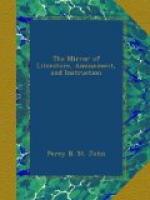“In the time of the Moors, the fortress was capable of containing an army of forty thousand men within its precincts, and served occasionally as a stronghold of the sovereigns against their rebellious subjects. After the kingdom had passed into the hands of the Christians, the Alhambra continued a royal demesne, and was occasionally inhabited by the Castilian monarchs. The Emperor Charles V. began a sumptuous palace within its walls, but was deterred from completing it by repeated shocks of earthquakes. The last royal residents were Philip V. and his beautiful queen Elizabetta of Parma, early in the eighteenth century. Great preparations were made for their reception. The palace and gardens were placed in a state of repair, and a new suite of apartments erected, and decorated by artists brought from Italy. The sojourn of the sovereigns was transient, and after their departure the palace once more became desolate. Still the place was maintained with some military state. The governor held it immediately from the crown, its jurisdiction extended down into the suburbs of the city, and was independent of the captain general of Granada. A considerable garrison was kept up, the governor had his apartments in the front of the old Moorish palace, and never descended into Granada without some military parade. The fortress, in fact, was a little town of itself, having several streets of houses within its walls, together with a Franciscan convent and a parochial church.
“The desertion of the court, however, was a fatal blow to the Alhambra. Its beautiful halls became desolate, and some of them fell to ruin; the gardens were destroyed, and the fountains ceased to play. By degrees the dwellings became filled up with a loose and lawless population; contrabandistas, who availed themselves of its independent jurisdiction to carry on a wide and daring course of smuggling, and thieves and rogues of all sorts, who made this their place of refuge from whence they might depredate upon Granada and its vicinity. The strong arm of government at length interfered: the whole community was thoroughly sifted; none were suffered to remain but such as were of honest character, and had legitimate right to a residence; the greater part of the houses were demolished and a mere hamlet left, with the parochial church and the Franciscan convent. During the recent troubles in Spain, when Granada was in the hands of the French, the Alhambra was garrisoned by their troops, and the palace was occasionally inhabited by the French commander. With that enlightened taste which has ever distinguished the French nation in their conquests, this monument of Moorish elegance and grandeur was rescued from the absolute ruin and desolation that were overwhelming it. The roofs were repaired, the saloons and galleries protected from the weather, the gardens cultivated, the water courses restored, the fountains once more made to throw up their sparkling showers; and Spain may thank her invaders for having preserved to her the most beautiful and interesting of her historical monuments.




